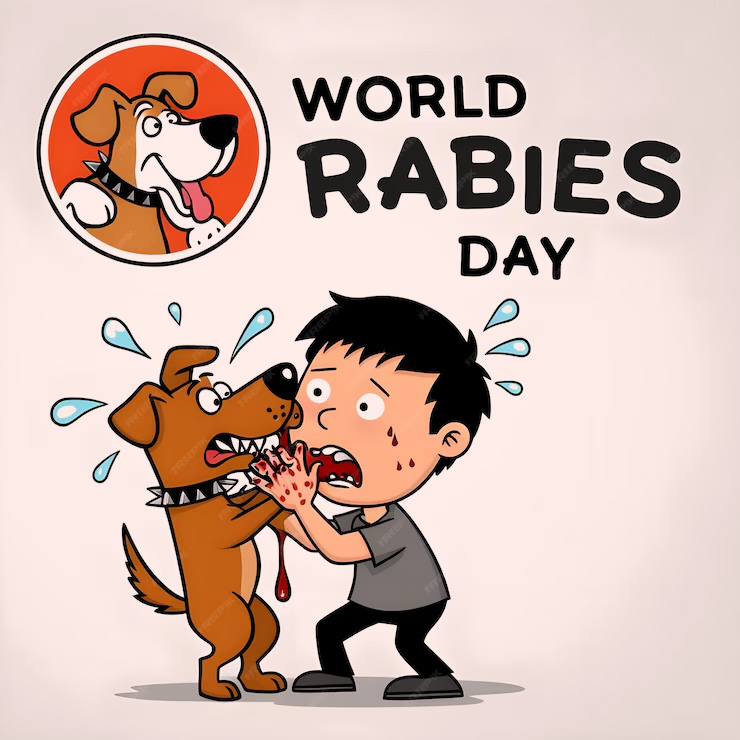
World Rabies Day, observed on September 28 every year, is dedicated to raising global awareness about rabies prevention and highlighting the efforts made to control this deadly disease. Spearheaded by the Global Alliance for Rabies Control (GARC), this day is an opportunity to reflect on how far we have come and the challenges we still face in eliminating rabies.
Table of Content:-
Rabies is a deadly viral disease that affects the central nervous system of mammals, including humans. It is primarily transmitted through the bite or scratch of an infected animal, most commonly dogs. Once symptoms of rabies appear, the disease is almost always fatal, making immediate treatment critical after exposure. Research shows that the rabies virus travels through the nervous system to the brain, leading to severe neurological symptoms such as agitation, hallucinations, and paralysis. Despite its severity, rabies is entirely preventable through timely vaccination and proper wound care, making awareness and early intervention essential in high-risk areas.
World Rabies Day 2024 Theme

According to the World Health Organization (WHO) the theme for World Rabies Day 2024 is 'Breaking Rabies Boundaries'. This theme focuses on pushing forward progress and going beyond the current status quo in the fight against rabies. It calls for a global commitment to breaking down the barriers that hinder access to vaccines, healthcare, education, and resources—especially in rural and underdeveloped areas where rabies remains a significant public health threat.
The message behind this year’s theme emphasises the importance of moving beyond traditional methods of rabies prevention and adopting innovative, inclusive approaches. By breaking these boundaries, communities can move closer to achieving the global goal of ending human deaths from rabies by 2030.
Also read: 4-Year-Old Boy Bitten By Stray Dog Dies Of Rabies In Tamil Nadu; Symptoms To Look Out For
History of World Rabies Day
World Rabies Day was first observed in 2007, thanks to the initiative of GARC. The date, September 28, was chosen in honour of Louis Pasteur, who developed the first rabies vaccine. His work laid the foundation for modern rabies prevention, and World Rabies Day celebrates this monumental achievement while continuing to emphasise the importance of vaccination.

Rabies, a zoonotic disease primarily spread by infected animals, has a nearly 100% fatality rate once symptoms appear. It is transmitted through the bites or scratches of infected animals, with dogs being responsible for the vast majority of human rabies cases. Despite the danger it poses, rabies is preventable through timely vaccinations and proper medical care, making awareness campaigns like World Rabies Day critical in high-risk regions.
Significance of World Rabies Day
The global campaign surrounding World Rabies Day is vital in raising awareness about the deadly yet preventable nature of the disease. Rabies claims nearly 59,000 lives annually, with 99% of human cases resulting from dog bites. The majority of these deaths occur in low- and middle-income countries, where access to vaccines and healthcare services is often limited.
Vaccination

Vaccination is the cornerstone of rabies prevention. Dog vaccination campaigns have been proven to be highly effective in controlling rabies outbreaks, as dogs are the primary source of human rabies cases. World Rabies Day encourages governments, non-profit organisations, and communities to invest in and support mass vaccination programs for both animals and humans.
Countries that have implemented widespread dog vaccination and post-exposure prophylaxis (PEP) for humans have seen significant reductions in rabies cases. In many developed countries, rabies has been almost entirely eradicated due to the successful implementation of these measures. However, in parts of Africa and Asia, access to vaccines remains a major challenge.
Conclusion
World Rabies Day 2024, with its theme 'Breaking Rabies Boundaries', encourages the global community to push beyond the current limitations in the fight against rabies. By raising awareness, improving access to vaccines, and fostering collaboration, we can move closer to a future where no one dies from this entirely preventable disease. Together, we can break the boundaries and save lives.
Also watch this video
How we keep this article up to date:
We work with experts and keep a close eye on the latest in health and wellness. Whenever there is a new research or helpful information, we update our articles with accurate and useful advice.
Current Version